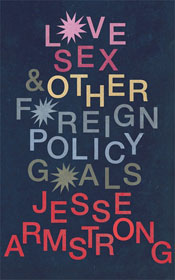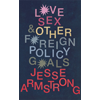This article is more than 1 year old
Philip Glass tells all and Lovelace and Babbage get the comic novel treatment
Plus: Love, Sex and Other Foreign Policy Goals
Love, Sex and Other Foreign Policy Goals
Jesse Armstrong is a television scriptwriter and the co-author of the screenplay to the acclaimed film Four Lions. He’s probably best known to British audiences as the co-writer of the comedy series Peep Show and the sweary political satire The Thick of It.
Love, Sex and Other Foreign Policy Goals takes place in the early 1990s and is narrated by Andy, who has “one of the most coherent foreign policies of anyone working on a building site in the Manchester area.”
The opening of the story finds Andy feeling inadequate at a posh birthday party for the girl of his dreams, Penny. At the gathering, Penny announces that she is off to Bosnia to deliver aid and perform a “peace play”. Despite parental opposition, her mind is made up.
We are then taken back to the recent past and discover that Andy migrated to Manchester from the Welsh borders, following his student girlfriend, Helen. As Andy and Helen’s relationship disintegrates, Andy joins a Stop The War meeting where the idea of the trip is conceived.
Andy is dragged along by his unrequited passion for Penny. The theatre group is basically a bunch of student wankers, “grotesque and terrifyingly pretend little adults.”
The first third of this book is truly an unedifying experience, the characters are so trite and ridiculous.

Andy describes his feelings for Penny thus: “Like wanking over a picture of Mahatma Gandhi, it proved hard to translate one strong feeling into another.” If I wasn’t being paid to read this book, I would probably have given up with it, much as I did with Four Lions after about 20 minutes of viewing.
However, when our crew get to Zagreb and new characters are introduced, things drastically improve. Firstly, there is a hilarious dinner party full of reactionaries at the British Embassy. “If Halifax could have made a decent peace with a trustworthy National Socialist, then there could have been a British Imperial Indian summer of extraordinary capital accumulation.”
Once our heroes and heroines are taken out of their comfort zone, the novel becomes a decent satire of naïfs well out of their depth in the tradition of Candide. We even get a mention of Pangloss’s ‘best of all possible worlds’ – “I felt I was a strident anti-racist. But on the strict unspoken understanding that this attitude should never cost me personally.”
The troupe’s experiences of the chaos of war causes a revelation: “Everything was becoming clear. Too clear – on the big boring canvas of the war.” Inevitably, one of their Bosnian associates eventually tells them what for: “Who are you to care about the whole world? Sending out blankets and your rice covering the world with your newspaper articles, like gunboats. Who the fuck do you think you are to care about me?”
As the author states earlier: “Is there any charity without a PR plan? Without a logo?”
Despite a somewhat excruciating start, Love, Sex and Other Foreign Policy Goals turns out to be an entertaining satire. As disillusion finally sets in, our crew reassure themselves: “At least we did something.”
Love, Sex and Other Foreign Policy Goals is a late bloomer. It is a tribute to Jesse Armstrong’s ability that he can rescue a decent first novel from such an unpromising beginning. I must have another go at Four Lions, which I am assured is another fine work with an underwhelming introduction.
 Author Jessse Armstrong
Author Jessse Armstrong
Title Love, Sex and Other Foreign Policy Goals
Publisher Jonathan Cape
Price £12.99 (Hardback), £8.98 (eBook)
More info Publication web site
